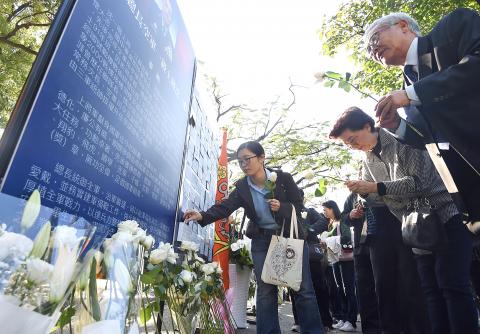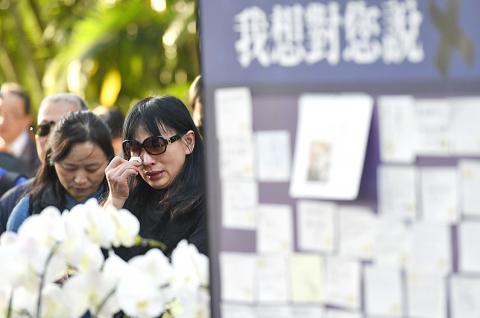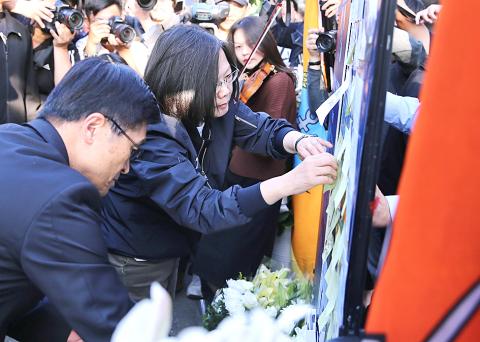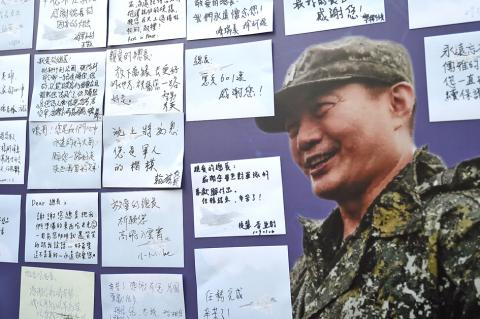A UH-60M Black Hawk helicopter that crashed on Thursday, killing eight military officers including the chief of the general staff, is unlikely to have gone down due to mechanical failure or weather, a Taiwan Transportation Safety Board official said yesterday.
Based on a preliminary investigation of the helicopter’s two flight data recorders, mechanical failure could be 80 percent ruled out as the cause, while weather, including elements such as turbulence and wind shear, could be 80 to 90 percent excluded, the official said.
However, the flight recorders contain a memory card that can only be decoded by the aircraft’s US-based manufacturer, they said.

Photo: Chien Jung-fong, Taipei Times
The card is to be sent to Sikorsky Aircraft Corp, as it contains important data about the helicopter’s mechanical systems and its operational handling, the bureau said.
Mechanical failure could be completely ruled only after the information is retrieved from the recorder, the official said, adding that the possibility of human error was also being considered.
The helicopter, carrying military personnel to Dongaoling Base (東澳嶺) in Yilan County, went down in the mountains of New Taipei City’s Wulai District (烏來) on Thursday with 13 people on board. Eight, including Chief of the General Staff General Shen Yi-ming (沈一鳴), died in the crash.

Photo: George Tsorng, Taipei Times
Military investigators extracted the flight recorders at about 10:40am the following day.
The Air Force Command Headquarters yesterday said it has received the recorders from the bureau and would hand them over to an investigation task force.
Citing the Air Force Flight and Ground Safety Regulations (空軍飛行及地面安全教範), the headquarters said that the task force must compare the recorder data with weather patterns, flight path data, the helicopter’s flight plan, record transcripts and maintenance records before preparing a final report.

Photo: Chien Jung-fong, Taipei Times
The headquarters also called on the media to avoid reporting unverified information, as the analysis and investigation would take some time.
Meanwhile, members of the public poured into the Taipei Guest House to pay their respects to the dead officers.
In addition to Shen, the deceased officers were Political Warfare Bureau Deputy Director Major General Yu Chin-wen (于親文), Major General Hung Hung-chun (洪鴻鈞) of the Office of the Deputy Chief of the General Staff for Intelligence, Major Huang Sheng-hang (黃聖航) of the Office of the Chief of the General Staff, Chief Master Sergent Han Cheng-hung (韓正宏), pilot Lieutenant Colonel Yeh Chien-yi (葉建儀), copilot Captain Liu Chen-fu (劉鎮富) and crew chief Master Sergeant Hsu Hung-pin (許鴻彬).

Photo: Chien Jung-fong, Taipei Times
Dressed in uniform, a member of the armed forces expressed grief over the loss of Shen, saying that he had been his commanding officer when he served at the Ministry of National Defense and had always cared for him.
Political Warfare Bureau staff officer Lieutenant Colonel Lee Chun-feng (李均峰) said that he had just been promoted by Yu and reported to the bureau on the day of the accident.
“I never thought I would never have a chance to report to Yu directly,” he said.
An animation created by members of the brigade in which Yu had originally served to wish him a happy Lunar New Year later this month had no use now, he added.
On a bulletin board dedicated to Hsu were two unsigned notes that said: “Dad, let’s play with your cellphone next time,” and “I love you, dad.”
Other notes left by Hsu’s colleagues and friends said: “The mission is over. Good work,” and “Thank you for what you have done for the nation.”
His father, weeping, said that Yeh, who was his first son, had on Wednesday called his mother “to wish her a happy birthday, yet the following day he was gone.”
Liu’s friends and relatives also mourned him, saying that he was raised by a single parent and had gotten married just last year.
President Tsai Ing-wen (蔡英文) visited the guest house after inspecting the Dongaoling radar station, where Shen had been scheduled to visit, to boost the morale of military personnel stationed there.
Tsai posted on the board dedicated to the deceased officers sticky notes written by military personnel stationed at the station who asked the president to post them on their behalf.
A formal public service is to be held on Jan. 14 at the Songshan Air Force Base in Taipei, the ministry said.
Separately yesterday, a ceremony was held at Wei-Shui’s Hill (渭水之丘) in Yilan County, followed by a rite to comfort the spirits of the deceased, which was attended by more than 1,000 people.
Additional reporting by Peng Wan-hsin

DAREDEVIL: Honnold said it had always been a dream of his to climb Taipei 101, while a Netflix producer said the skyscraper was ‘a real icon of this country’ US climber Alex Honnold yesterday took on Taiwan’s tallest building, becoming the first person to scale Taipei 101 without a rope, harness or safety net. Hundreds of spectators gathered at the base of the 101-story skyscraper to watch Honnold, 40, embark on his daredevil feat, which was also broadcast live on Netflix. Dressed in a red T-shirt and yellow custom-made climbing shoes, Honnold swiftly moved up the southeast face of the glass and steel building. At one point, he stepped onto a platform midway up to wave down at fans and onlookers who were taking photos. People watching from inside

A Vietnamese migrant worker yesterday won NT$12 million (US$379,627) on a Lunar New Year scratch card in Kaohsiung as part of Taiwan Lottery Co’s (台灣彩券) “NT$12 Million Grand Fortune” (1200萬大吉利) game. The man was the first top-prize winner of the new game launched on Jan. 6 to mark the Lunar New Year. Three Vietnamese migrant workers visited a Taiwan Lottery shop on Xinyue Street in Kaohsiung’s Gangshan District (崗山), a store representative said. The player bought multiple tickets and, after winning nothing, held the final lottery ticket in one hand and rubbed the store’s statue of the Maitreya Buddha’s belly with the other,

‘NATO-PLUS’: ‘Our strategic partners in the Indo-Pacific are facing increasing aggression by the Chinese Communist Party,’ US Representative Rob Wittman said The US House of Representatives on Monday released its version of the Consolidated Appropriations Act, which includes US$1.15 billion to support security cooperation with Taiwan. The omnibus act, covering US$1.2 trillion of spending, allocates US$1 billion for the Taiwan Security Cooperation Initiative, as well as US$150 million for the replacement of defense articles and reimbursement of defense services provided to Taiwan. The fund allocations were based on the US National Defense Authorization Act for fiscal 2026 that was passed by the US Congress last month and authorized up to US$1 billion to the US Defense Security Cooperation Agency in support of the

HIGH-TECH DEAL: Chipmakers that expand in the US would be able to import up to 2.5 times their new capacity with no extra tariffs during an approved construction period Taiwan aims to build a “democratic” high-tech supply chain with the US and form a strategic artificial intelligence (AI) partnership under the new tariffs deal it sealed with Washington last week, Taipei’s top negotiator in the talks said yesterday. US President Donald Trump has pushed Taiwan, a major producer of semiconductors which runs a large trade surplus with the US, to invest more in the US, specifically in chips that power AI. Under the terms of the long-negotiated deal, chipmakers such as Taiwan Semiconductor Manufacturing Co (TSMC, 台積電) that expand US production would incur a lower tariff on semiconductors or related manufacturing